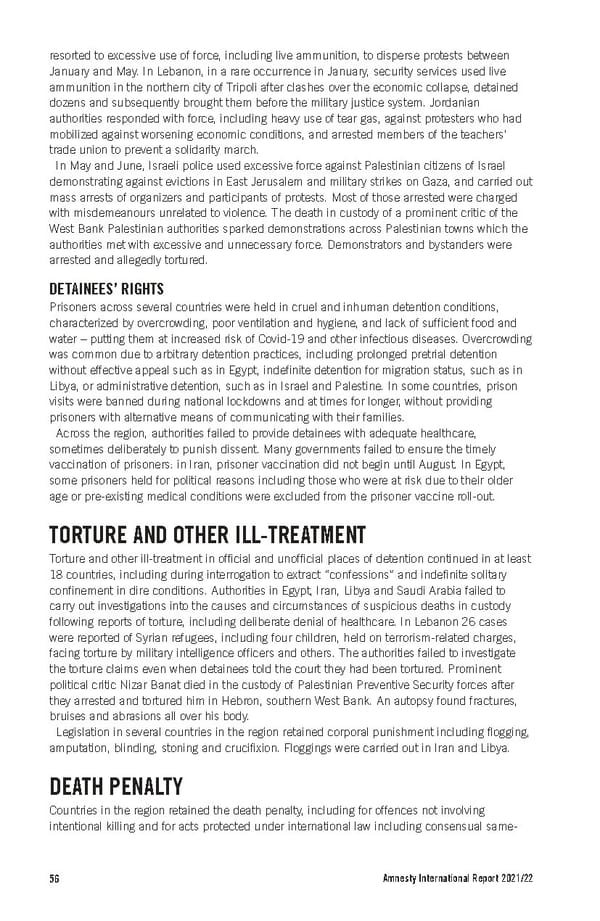resorted to excessive use of force, including live ammunition, to disperse protests between January and May. In Lebanon, in a rare occurrence in January, security services used live ammunition in the northern city of Tripoli after clashes over the economic collapse, detained dozens and subsequently brought them before the military justice system. Jordanian authorities responded with force, including heavy use of tear gas, against protesters who had mobilized against worsening economic conditions, and arrested members of the teachers’ trade union to prevent a solidarity march. In May and June, Israeli police used excessive force against Palestinian citizens of Israel demonstrating against evictions in East Jerusalem and military strikes on Gaza, and carried out mass arrests of organizers and participants of protests. Most of those arrested were charged with misdemeanours unrelated to violence. The death in custody of a prominent critic of the West Bank Palestinian authorities sparked demonstrations across Palestinian towns which the authorities met with excessive and unnecessary force. Demonstrators and bystanders were arrested and allegedly tortured. DETAINEES’ RIGHTS Prisoners across several countries were held in cruel and inhuman detention conditions, characterized by overcrowding, poor ventilation and hygiene, and lack of sufficient food and water – putting them at increased risk of Covid-19 and other infectious diseases. Overcrowding was common due to arbitrary detention practices, including prolonged pretrial detention without effective appeal such as in Egypt, indefinite detention for migration status, such as in Libya, or administrative detention, such as in Israel and Palestine. In some countries, prison visits were banned during national lockdowns and at times for longer, without providing prisoners with alternative means of communicating with their families. Across the region, authorities failed to provide detainees with adequate healthcare, sometimes deliberately to punish dissent. Many governments failed to ensure the timely vaccination of prisoners: in Iran, prisoner vaccination did not begin until August. In Egypt, some prisoners held for political reasons including those who were at risk due to their older age or pre-existing medical conditions were excluded from the prisoner vaccine roll-out. TORTURE AND OTHER ILL-TREATMENT Torture and other ill-treatment in official and unofficial places of detention continued in at least 18 countries, including during interrogation to extract “confessions” and indefinite solitary confinement in dire conditions. Authorities in Egypt, Iran, Libya and Saudi Arabia failed to carry out investigations into the causes and circumstances of suspicious deaths in custody following reports of torture, including deliberate denial of healthcare. In Lebanon 26 cases were reported of Syrian refugees, including four children, held on terrorism-related charges, facing torture by military intelligence officers and others. The authorities failed to investigate the torture claims even when detainees told the court they had been tortured. Prominent political critic Nizar Banat died in the custody of Palestinian Preventive Security forces after they arrested and tortured him in Hebron, southern West Bank. An autopsy found fractures, bruises and abrasions all over his body. Legislation in several countries in the region retained corporal punishment including flogging, amputation, blinding, stoning and crucifixion. Floggings were carried out in Iran and Libya. DEATH PENALTY Countries in the region retained the death penalty, including for offences not involving intentional killing and for acts protected under international law including consensual same- Amnesty International Report 2021/22 56
 Amnesty International Report 2021/22 Page 55 Page 57
Amnesty International Report 2021/22 Page 55 Page 57